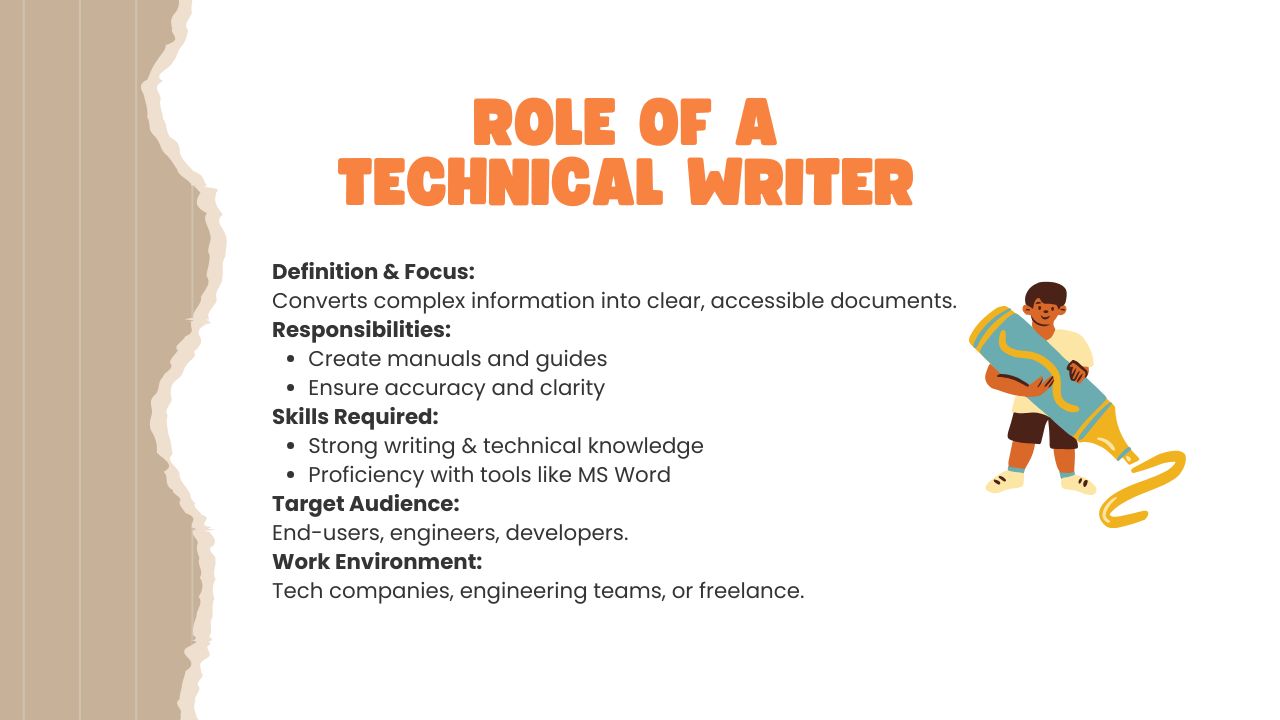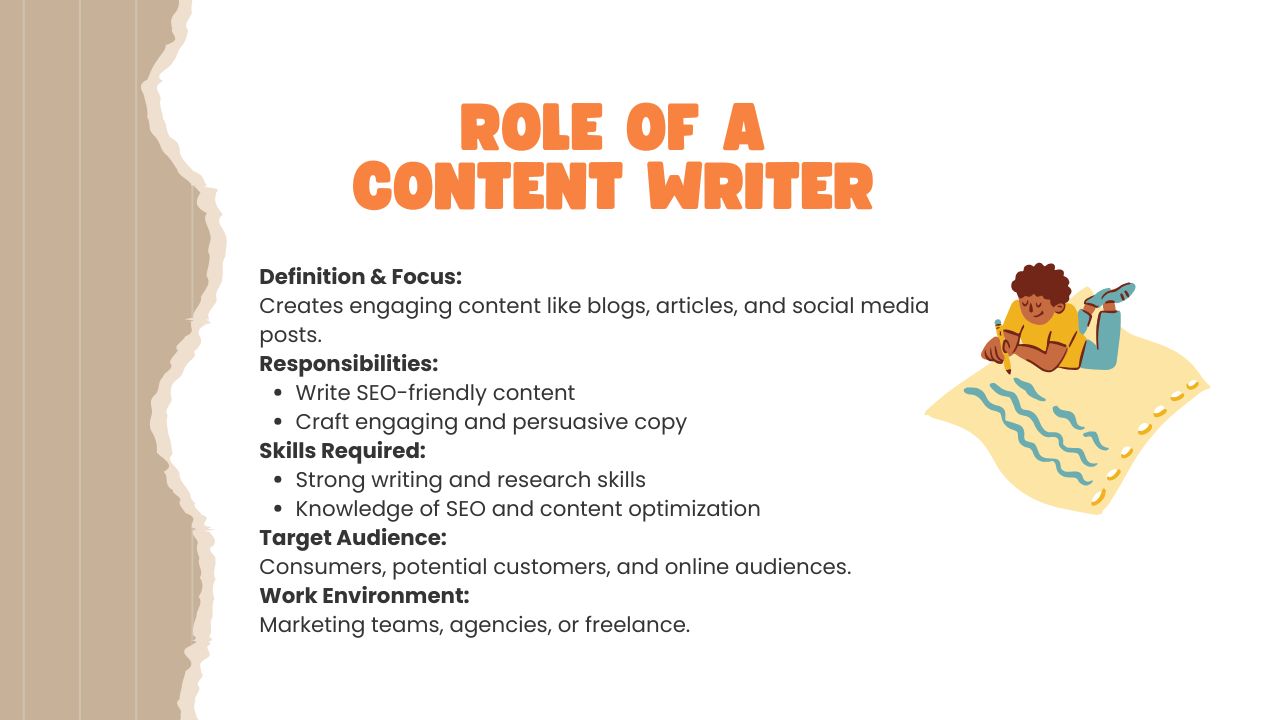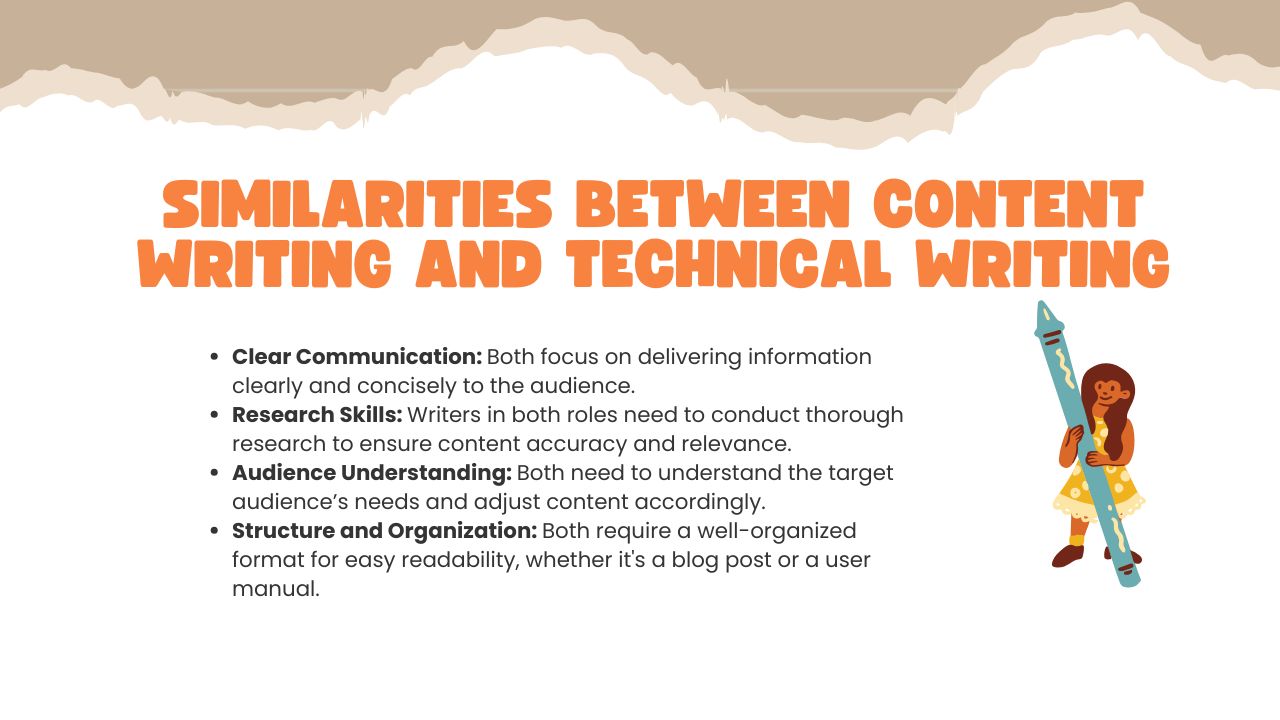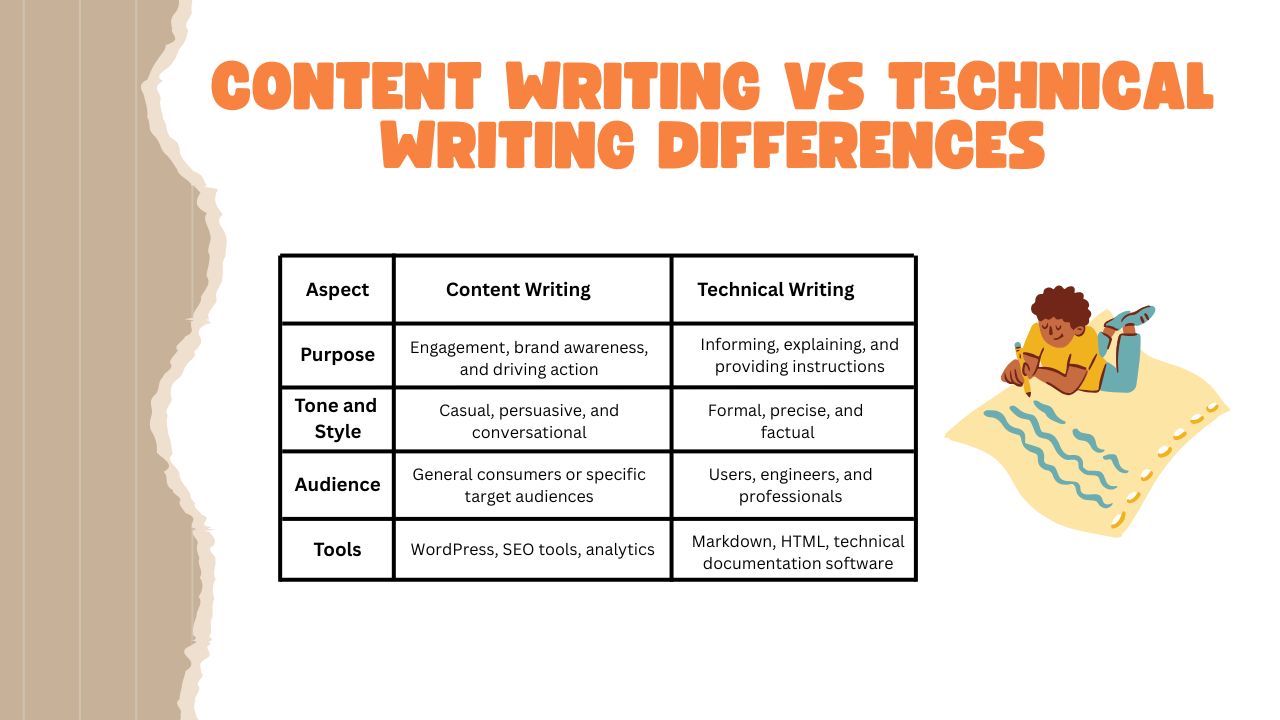Content Writing vs Technical Writing - Uncover Differences You Need to Know
Table of Contents
ToggleWhen businesses think about writing, they often lump everything under “content.” But the truth is, not all writing is created equal. Two roles, content writing vs technical writing, play very different parts in shaping communication.
If you’ve ever wondered why some blogs sound breezy and conversational while others read like a product manual, you’re already glimpsing the difference between content writing vs technical writing.
Understanding these roles is more than semantics—it impacts how brands connect with users, sell products, and explain complex ideas. Let’s pull back the curtain and look at what sets these two crucial writing styles apart.
Table of Contents
ToggleUnderstanding the Role of a Technical Writer
A technical writer plays a crucial role in translating complex information into clear, user-friendly content. Their primary focus is to help users understand products, processes, or systems through well-organized documentation.
Definition and Focus:
A technical writer specializes in turning complex ideas into clear, actionable information. Their main focus isn’t to entertain or persuade, it’s to instruct. Think user manuals, software documentation, and product installation guides.
For businesses developing technical products, the role of technical writing is mission-critical. Without it, users would be left guessing how to navigate new tools or services.
Responsibilities:
A technical writer’s job isn’t just “writing things down.” It’s about:
- Researching deeply with subject matter experts
- Structuring information for easy navigation
- Updating documents as products evolve
- Ensuring accuracy, compliance, and clarity
Good documentation often makes or breaks a customer’s experience with a product.


Required Skills:
Technical writing skills lean heavily on clarity, logic, and organization. A strong technical writer is part detective (digging for hidden details) and part translator (making it all user-friendly).
Experience with tools like MadCap Flare, Confluence, or Adobe FrameMaker often comes into play, too.
Tone and Style:
Tone stays formal, objective, and instructional. Jargon is trimmed back only enough to avoid confusion, precision matters more than personality.
Imagine writing a plane’s emergency manual. There’s no room for humor or ambiguity.
Target Audience:
Technical writers mostly write for users, engineers, and stakeholders who need specific, practical knowledge. It’s not about grabbing attention, it’s about helping someone solve a problem fast.
Work Environment:
You’ll find technical writers deep inside industries like software, healthcare, engineering, or manufacturing. They often work alongside developers, product managers, and quality assurance teams. Collaboration is constant, and so is learning.
Understanding the Role of a Content Writer
A content writer creates engaging and informative content designed to capture the attention of a target audience. Their role involves crafting blog posts, articles, and marketing copy that align with a brand’s voice and goals.
Definition and Focus:
Content writing shapes the core message behind every blog post, landing page, and social media caption. It’s not just about writing; it’s about crafting content that aligns with a brand’s goals and drives action.
The role of content writing here?
Engaging audiences, building trust, and guiding them towards specific actions.
Responsibilities:
Content writers take on various tasks, including:
- Auditing existing content to identify gaps
- Planning and creating content aligned with marketing campaigns
- Developing brand voice guidelines
- Collaborating with SEO teams to create content optimized for search engines
- Monitoring performance metrics such as clicks, conversions, and shares
Creativity meets business outcomes in this process, as content writing plays a key role in driving results.


Required Skills:
Content writing involves more than just strong writing skills. Writers need to understand user behavior, keyword research, messaging frameworks, and sales funnels. Tools like SEMrush, Ahrefs, Trello, and WordPress are essential for optimizing content.
Tone and Style:
The tone shifts based on the brand’s identity. For example, a fintech brand may adopt a professional tone, while a pet care company might keep it warm and friendly. The key is to remain clear, human, and resonate with the audience.
Target Audience:
The audience varies from future customers to loyal fans or even investors. Content writers always write with empathy, considering what the reader needs and expects at each stage of their journey.
Work Environment:
Content writers work in marketing teams, creative agencies, or as freelancers. They frequently collaborate with designers, social media managers, and SEO experts to produce content that meets business objectives.
Similarities Between Content Writing vs Technical Writing
While content writing vs technical writing have distinct roles, they share some key similarities. Both focus on creating clear, engaging content that serves a specific purpose and resonates with their intended audience.
Clear Communication
Both content writing vs technical writing revolve around delivering clear, easy-to-understand information.
Regardless of the topic or format, the ultimate goal is to make complex ideas simple for the audience.
- Focus on clarity and precision
- Avoid unnecessary jargon
- Break down complex topics into digestible chunks
Research-Driven Approach
Strong research is non-negotiable for both roles. The depth may vary, but the methodical approach remains the same.
- Technical writers often work with subject matter experts
- Content writers dive into market research and audience behavior
- Accuracy and credibility are central to both


Structured Content Creation
Good writing isn’t just about words, it’s about how those words are organized. Structure helps readers find the information they need fast.
- Use of clear headings and subheadings
- Bullet points and numbered lists for better readability
- Logical flow from start to finish
Audience-Centric Thinking
Both types of writers shape their work around what the reader needs.
- Anticipate questions before readers ask them
- Focus on user experience
- Keep language accessible and appropriate for the target audience
Key Differences Between Content Writing vs Technical Writing
Although content writing vs technical writing share some similarities, the differences are where things get interesting. Let’s break down how they diverge in focus, style, and purpose:
Focus
- Technical Writers focus on providing precise, practical information to help users understand complex systems or solve specific problems.
Examples include product manuals, user guides, or FAQs.
- Content Writers, on the other hand, aim to engage, inform, or persuade a broader audience. They often create blog posts, articles, and marketing content designed to drive brand awareness, conversions, or engagement.
Subject Matter Expertise
- Technical Writers often specialize in understanding highly specific products, software, or services. They typically work closely with engineers or product teams to gather technical insights.
- Content Writers usually work across a range of industries, adapting their writing to different subjects and audiences. They need to be versatile in researching and writing about diverse topics.
Style and Tone
- Technical Writing is objective, formal, and structured. The focus is on clarity, accuracy, and usability. There’s no room for fluff or personal opinions.
- Content Writing can be more conversational, emotional, or persuasive, depending on the audience and platform. The tone might vary from friendly and approachable to authoritative and professional.


Goal
- Technical Writers aim to educate the reader with detailed instructions or explanations. Their goal is functionality and usability.
Example: Helping a user navigate a complicated software feature.
- Content Writers seek to capture attention, inform, or persuade readers. Their goal is engagement and fostering a connection with the brand.
Example: Convincing readers to subscribe to a newsletter or make a purchase.
Tools
- Technical Writers often use specialized tools like MadCap Flare, Confluence, or Adobe FrameMaker to create, manage, and publish their documentation.
- Content Writers typically work with content management systems (CMS) like WordPress, along with SEO tools like Ahrefs, SEMrush, or Google Analytics to optimize content for search engines.
Objectivity vs. Subjectivity
- Technical Writing is grounded in facts. There’s little room for subjective language or creativity. The focus is purely on factual accuracy and step-by-step instructions.
- Content Writing allows for more creativity and subjective language. Writers often need to adapt their tone and style to resonate with a target audience, leveraging storytelling and emotional appeal.
Target Audience
- Technical Writers target users who need clear, actionable, and factual content to operate or troubleshoot a product or service.
- Content Writers generally write for a broader audience, ranging from potential customers to loyal followers, often aiming to inform, entertain, or inspire action.
The Evolution and Future of Technical Writing
The field of technical writing has evolved significantly with advancements in technology and user expectations. As businesses adapt, the role of technical writers is expanding to include new tools, formats, and a stronger focus on user experience.
Shift to Digital Documentation
- Traditional printed manuals are being replaced by online help centers and interactive guides, allowing for faster updates and global access.
- Video tutorials and interactive content are becoming essential for user engagement, offering a more dynamic way to communicate technical information.
Growing Demand for Tech-Savvy Writers
- Today’s technical writers need more than writing skills. Familiarity with HTML, CSS, and even coding basics is becoming essential.
- UX writing is gaining importance, ensuring content is user-friendly and fits seamlessly within product designs.
AI and Automation in Technical Writing
- AI tools are automating routine content like release notes and FAQs, allowing writers to focus on more complex tasks.
- AI-powered translation and localization are streamlining global content creation.
The Future: Blended Roles
- As technical writing evolves, writers will blend content creation, UX design, and interactive media, transforming traditional manuals into dynamic, user-centered experiences.
Conclusion
The lines between content writing vs technical writing may blur, but the core distinction remains clear: one focuses on precise, functional information, while the other emphasizes engagement and persuasion.
Both roles are essential to any successful content plan, each complementing the other. As technology and user expectations continue to evolve, the future of writing will demand adaptability, creativity, and a keen understanding of audience needs.
Whether you’re crafting a technical manual or a blog post, understanding these roles and how they contribute to a business’s goals is crucial for creating content that not only informs but also drives action.
Ready to take your content to the next level or discover expert writing services? Get in touch with us to begin.
